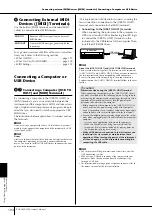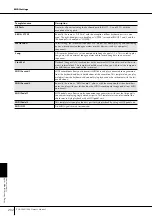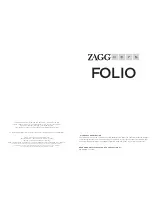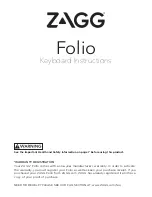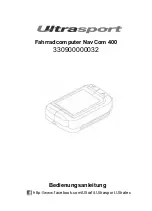
Using
Your Instrument with
Other Devices
PSR-3000/1500 Owner’s Manual
204
MIDI Settings
●
Tx MONITOR
The dots corresponding to each channel (1-16) flash
briefly whenever any data is transmitted on the chan-
nel(s).
n
When different parts are assigned to the same transmit
channel
If the same transmit channel is assigned to several different parts,
the transmitted MIDI messages are merged to a single channel —
resulting in unexpected sounds and possible glitches in the con-
nected MIDI device.
n
About the protected Songs
Write-protected Songs and GS songs cannot be transmitted even if
the proper Song channels 1–16 are set to be transmitted.
■
MIDI messages which can be transmitted or
received (recognized)
The following MIDI messages can be set on the TRANS-
MIT/RECEIVE display.
• Note (Note events).......................................page 162
• CC (CONTROL CHANGE) ..........................page 162
• PC (PROGRAM CHANGE)...........................page 162
• PB (Pitch Bend)............................................page 162
• AT (Aftertouch).............................................page 162
MIDI Receive Settings
The explanations here apply to the RECEIVE display to
be called up in step 4 of the “Basic Operation” on
page 201. This determines which parts will receive
MIDI data and over which MIDI channels the data will
be received.
Operation
Select the channel to be received and the part via which
the selected channel will be received. You can also
determine the types of data to be received.
●
The PSR-3000/1500 can receive MIDI messages
over 32 channels (16 channels x 2 ports) by USB
connection.
●
With the exception of the two parts below, the
configuration of the parts is the same as those
already explained elsewhere in this manual.
• KEYBOARD
The received note messages control the PSR-3000/
1500’s keyboard performance.
• EXTRA PART 1-5
There are five parts specially reserved for receiving
and playing MIDI data. Normally, these parts are not
used by the instrument itself. The PSR-3000/1500 can
be used as a 32-channel multi-timbral tone generator
by using these five parts in addition to the general
parts (except for the microphone sound).
●
Rx MONITOR
The dots corresponding to each channel (1–16) flash
briefly whenever any data is received on the channel(s).
n
Parameter Lock
You can “lock” specific parameters (e.g., effect, split point, etc.) to
make them selectable only via the panel controls (page 131).
■
MIDI transmission/reception via the USB ter-
minal and MIDI terminals
The relationship between the [MIDI] terminals and the
[USB] terminal which can be used for transmitting/
receiving 32 channels (16 channels x 2 ports) of the
MIDI messages is as follows:
Setting the Bass Note for Style Playback
via MIDI Receive
The explanations here apply to the BASS display to be
called up in step 4 of the “Basic Operation” on
page 201.
These settings let you determine the bass note for Style
playback, based on the note messages received via
MIDI. The note on/off messages received at the chan-
nel(s) set to “ON” are recognized as the bass note of the
chord of Style playback. The bass note will be detected
regardless of the [ACMP ON/OFF] or split point set-
tings. When several channels are simultaneously set to
“ON,” the bass note is detected from merged MIDI data
received over the channels.
RECEIVE display
MIDI/USB1
01–16
USB2
01–16
USB2
USB1
Merge
Merge
MIDI/USB 01–16
Port
handling
[MIDI IN] jack
MIDI reception
MIDI transmission
[USB TO
HOST] jack
[MIDI OUT] jack
[USB TO
HOST] jack
BASS display





